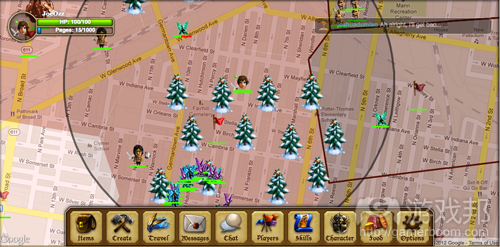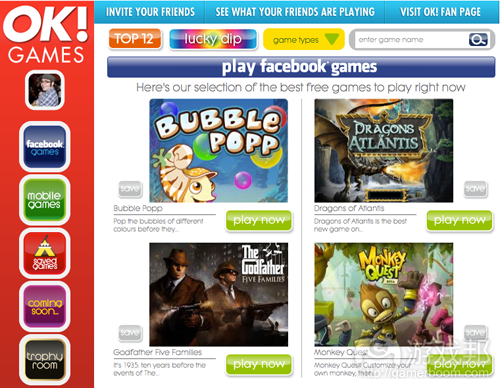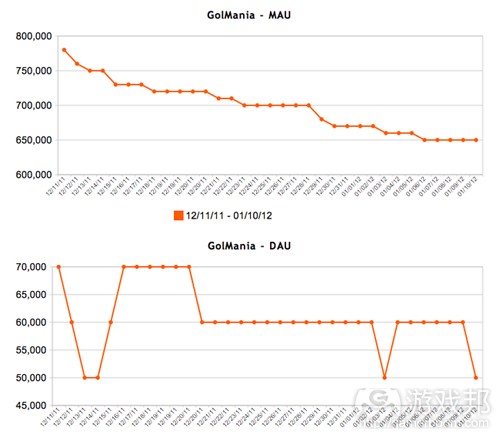每日观察:关注2016年手机游戏虚拟商品市场规模(1.11)
1)Juniper Research最新手机游戏报告预测,游戏内置虚拟商品销售额将从2011年的21亿美元增长至2016年的48亿美元。目前虚拟道具的主要消费群体是硬核游戏用户,但随着免费增值模式的普及,休闲社交游戏付费玩家也将大幅增长。
Juniper还指出,采用免费模式有助于减少盗版现象,同时又能让开发商通过销售虚拟商品创收。该公司曾在10月份报告预测,2016年虚拟商品交易市场规模将达46亿美元。
2)据All Facebook报道,游戏开发商PerBlue最近将旗下的MMO手机游戏《Parallel Kindom》引进Facebook。该游戏使用了谷歌地图功能,支持玩家与本地好友一起在世界各地参加战役。
虽然观察者认为,这个Facebook版游戏失去了原来手机版游戏的精髓,但仍不失其自身特色,例如绑定了Facebook Games Ticker功能,可让玩家看到好友何时在线;另外这款游戏便于标记,其音效也较为出色。
3)据games.com报道,谷歌近日宣布谷歌地图团队正针对Google+Games平台开发原创游戏《Play Your World》。
游戏采用了WebGL技术,结合谷歌地图功能及经典的雅达利街机游戏《Marble Madness》风格,预计将于2月份发布。
4)英国花边新闻杂志《OK!?》最近与TeePee Games合作推出自己的社交游戏门户OK!Games,向其读者推荐最新游戏。
这款Facebook应用及其Android版本目前已上线,支持该杂志读者通过OK!Games的Facebook粉丝面面与好友互动,分享各自的游戏内容。
5)2009年普利策奖得主Nicholas Kristof和Sheryl WuDunn(游戏邦注:这两名记者因描述妇女受到压迫的《半边天》这部纪实性畅销书而得奖)已通过在线视频等多种媒体渠道宣扬其作品精神,最近Kristof表示社交游戏也是一个有力的传播工具。
他称自己认为游戏将成为一个孕育新组织和公益项目的平台,他们希望借助在线游戏的人气使关爱女性的活动得到关注,他和妻子已经制作了《半边天》的电视纪录片,他们还与Games for Change合作据此开发了一款Facebook游戏(英国公司Mudlark和印度公司ZMQ将针对手机平台开发四款以该书为题材的游戏),希望由此让那些很少看书的群体通过Facebook了解其主张的精神。
据称这款游戏“与《FarmVille》类似”,玩家在其中的任务是照顾城镇中的妇女和女孩,其中包括管理学校和难民营的内容,此外玩家还可以从中直接向公益机构捐款。
6)巴西社交游戏开发商Vostu最近表示,在实时多人互动模式的社交游戏中,玩家向他人发送邀请的概率比一般社交游戏高三倍左右。
该公司以旗下游戏《GolMania》这款休闲足球游戏为例,指出参与多人模式竞争的玩家比单人模式玩家更喜欢邀请好友参赛,另外还发现玩家一般更愿意邀请好友参与在线互动而非异步互动。所以Vostu根据这一数据反映的信息,在之后发布的游戏中植入实时多人模式。
据AppData数据显示,《GolMania》的Facebook用户在2011年11月中旬达到高峰,MAU和DAU分别为91万和10万。但该游戏现在MAU已降至65万,DAU为5万,其用户留存率不足10%。不过据该公司所称,公司游戏在Orkut的人气比在Facebook高十倍。(本文为游戏邦/gamerboom.com编译,拒绝任何不保留版权的转载,如需转载请联系:游戏邦)
1)In-game item sales to hit $4.8bn by 2016
by Tim Green
And a third of the money will come from tablet-based gamers.
A new report from Juniper Research says sales of in-game items will rise from $2.1 billion in 2011 to $4.8 billion in 2016.
It believes the growing acceptance of virtual items and the whole freemium habit will encourage a big spike in usage among casual social gamers. At present much of the activity comes from a more hardcore demographic.
Juniper also claims that in-game purchases will play its part in reducing piracy as the game is typically downloaded for free, and any purchases must be verified via the developers’ server.
Report author Charlotte Miller said: “An increasing number of games developers are finding the in-game purchase model attractive simply because it provides easy answers.
“Their piracy rate will drop and the game will see more downloads. However, while some games may generate significant revenues from in-game items, the model doesn’t work with all games and developers have to tread a fine line between encouraging purchases and appearing to be exploitative.”
The announcement is similar to one made in October by Juniper, in which it said virtual goods would hit $4.6bn in 2016. It does this quite regularly.(source:mobile-ent)
2)Mobile MMO Parallel Kingdom takes a breather on Facebook
by Joe Osborne
Long known as an MMO (massively multiplayer online game) on phones designed to get players to explore the world around them, Parallel Kingdom has launched on Facebook. And frankly, that gem of a feature is now gone (and has been since the game hit the web), leaving nothing but icons to click depicting trolls and dragons over Google’s map of New York City and your own, real-life locations. So, why take the one thing out of Parallel Kingdom that made it, well, interesting?
“People want to play games in the environment they are most comfortable with, be that mobile, the Web, Kongregate, or Facebook,” Justin Beck, co-founder and CEO of Parallel Kingdom developer PerBlue, told All Facebook. “We don’t want to make people jump over fences to enjoy Parallel Kingdom, and that means meeting our players where they are. Thousands of users have already joined during beta, and since launching on these new platforms, the community is growing quickly.”
Parallel Kingdom uses Google Maps to allow players to their local hang outs all over the world into battlefields to wage war on and territories to conquer. Based on our brief experience, there’s not much to get pumped about with this release now that the charm of actually taking over your own stomping grounds, while really stomping on them, is still absent. However, this version of Parallel Kingdom does bring some interesting changes.
First, Parallel Kingdom has been integrated with the Facebook Games Ticker, so players can see when they’re friends are in the game. Second, the game can be easily bookmarked and, finally, new sound effects accompany much of players’ actions in Parallel Kingdom. Alright, so that’s not really a ton of jaw-dropping features. But for those who simply can’t get enough Parallel Kingdom, here’s another place to play.(source:games)
3)Google says, ‘Fine, we’ll make our own games,’ teases Play Your World
by Joe Osborne
This here is neither a tit nor tat situation. Google has revealed that the Google Maps team is working on its very own game for the Google+ Games platform. It’s called Play Your World, and–based on a 27-second teaser–transforms Google Maps into a game reminiscent of the classic Marble Madness arcade game by Atari.
And, judging from the title, we imagine players will be able to turn any old location in a level to play with.There’s a lot to gather from a 27-second video, you know, like how the game will have players guide a tiny ball along the streets and roads of major locations like the Las Vegas Strip and New York City.
Well, that’s about it in terms of specifics (aside from that the Google Maps team is using WebGL to make Play Your World), but this marks an interesting turn for Google, which has before now taken a similar stance to Facebook on social games. That being simply curate the platform, and don’t get into making your own games.
If anything, this is certainly a unique way to one-up Facebook in the social games world. Whether this marks the start of Google walking down the path of games or this is just a one-off experiment, it’s way too early to tell. Play Your World is coming in February.(source:games)
4)OK! Magazine teams with TeePee to gossip about next big social game
by Joe Osborne
“You mean you haven’t heard about that new Facebook game that’s out from OK!?” That’s not exactly what you’d expect readers of the UK gossip magazine to gush about to one another, but could it be in the future? Maybe, just maybe, as social games discovery engine TeePee Games and OK! have launched the latter’s own social gaming portal, OK! Games, that recommends new games to its readers.
The duo’s Facebook app is now live–along with one for Android devices–that suggests social games for its largely female audience to play. The predominantly middle-aged mother player base of social games appears to be the inspiration for the partnership. The magazine’s readers can reach OK! Games through its Facebook fan page to interact with their friends, share games and see what games their fellow OK! readers are playing.
“This is a great venture for TeePee Games and it really shows off our proprietary technology and how this can be used by huge consumer brands to engage, on another level, with their audience,” TeePee CEO Tony Pearce said in a release. “We’re delighted to be partnering with OK! Magazine to launch something truly exciting for their readers. OK! Games will keep their online audience extremely engaged with the brand, and will keep them coming back for more.”
We imagine some semblance of TeePee’s Geronimo engine, which learns a social gamer’s tastes as the player uses the app more often, has taken shape within the OK! Games Facebook app. We’ll see whether the same folks who read OK! are the same who enjoy a bit of FarmVille every now and again. (source:games)
5)NYT journalist plans Facebook game to raise ‘Half the Sky’ awareness
by Jenny Ng
Back in 2009, Pulitzer-prize winning journalists Nicholas Kristof and Sheryl WuDunn published Half the Sky, a non-fiction book highlighting the global oppression of women and how its evils pose “the central moral challenge of our time.” Its title comes from a Chinese proverb often attributed to Mao Zedong that “women hold up half the sky”, and yet, in most parts of the world, they are abused and undervalued. Amidst a sea of positive reviews, the book became a national bestseller that year, holding the bestseller list for seven week’s straight.
But the book was only the beginning, as the authors tried various other ways to get their message out, via transmedia projects ranging from online videos to concerts. Among the many tools being employed, Kristof has become a big believer in the power of social games:
I think gaming might be the next big platform for news organizations and causes. There’s some snobbery about games. Some people think games are just “what teenagers do” or that they are too fun to be worthy of our attention. But there are a lot of people who spend a lot of time playing games online, so we in the news business would do well to think about how we can use games to attract eyeballs. My wife and I are doing a TV documentary of our book Half the Sky, but we’re also creating a Facebook game as part of it.
This is why he partnered with Games for Change (G4C) to build several social games based on the book, one of which will be on Facebook. UK-based Mudlark and ZMQ in India will be developing four games for mobile phones. But to reach the widest audience — “people who may not necessarily engage with the book, the New York Times, or PBS” — Facebook is seen as the answer. The game’s release will follow a “Half the Sky” four-hour PBS documentary series scheduled for this fall.
As for the game itself, details are sparse, but Kristof describes it as “analogous to FarmVille” and set in a village where you’re tasked to care for women and girls, and that involves managing schools and refugee camps. Besides that, players will also be given more direct ways to contribute to the cause.(source:games)
6)Vostu: social games with real-time multiplayer more likely to go viral
Kathleen De Vere
Incorporating real-time multiplayer interactions in social games makes it three times more likely a player will send invitations to friends who aren’t already playing the game, according to Vostu.
The Latin American social game company made the discovery after reviewing the data from GolMania, a casual soccer game with a single player campaign and real-time multiplayer matches. Vostu found that GolMania players who played in multiplayer matches were three times more likely to invite their friends to start playing the game than players who had only played the single player campaign. Overall, Vostu’s players were much more willing to invite their friends to live interactions than they were for asynchronous interactions — the most common type of social elements in social games.
Based on the information gathered from GolMania, Vostu has decided to add real-time multiplayer elements to a number of its recent and soon-to-be released titles, the first of which will be a Puzzle Bobble-inspired title called Candy Dash. Although the game was built to use the same multiplayer technology as GolMania, Vostu didn’t include a multiplayer mode when the game launched at the end of December. As of tomorrow, players will able to access Candy Dash’s new multiplayer mode and compete one-on-one to see who can fill a progress bar the fastest.
Vostu’s next game will be another casual social game and will launch the end of January with active multiplayer features. The company is currently evaluating how to add similar features to traditional social games, like its biggest hits MegaCity and MiniFazenda.
According to AppData, GolMania’s Facebook user base peaked in mid-November with 910,000 MAU and 100,000 DAU. Since then the game has declined to 650,000 MAU and 50,000 DAU, putting its retention rate below 10 percent. According to Vostu, the company’s games are about 10 times as popular on Orkut as they are on Facebook.(source:insidesocialgames)













































 闽公网安备35020302001549号
闽公网安备35020302001549号